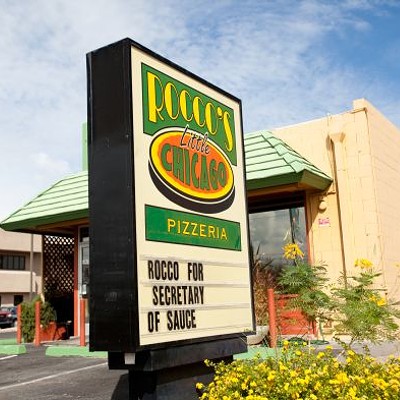Penetrating about 300 feet into the parched earth is the well that sustains his family. Like other folks in this stretch south of Tucson, Robuck worries that his patch of paradise might go dry if a copper mine is allowed to open nearby. The mine could suck down the underground water table, leaving it beyond the reach of hundreds of local residential wells.
So far, the Canadian mining company, Augusta Resource Corp., seems willing to make sure that such a crisis doesn't occur. Augusta has even agreed to deepen the wells of more than 200 homeowners if necessary.
But Robuck, who happens to be running for the District 2 seat on the Pima County Board of Supervisors, says he finds such promises rather dubious. "Originally, Augusta was talking about putting money in an account, and if your well went dry, the money would help to deepen it so you'd have water. They were also going to have some emergency plan to get water to you until your well was fixed."
Then things began to change, he says. "Now, they've come up with some insurance program, so if for some reason your well broke, the insurance would pay to fix it."
He doesn't believe Augusta will actually institute either program, particularly since Arizona water laws practically give mining companies carte blanche to drain an aquifer wherever and whenever they like.
This particular pit would be dug in Rosemont Valley, in the Santa Rita Mountains south of Tucson. Since part of the mining operation would spill onto federal forest lands, Coronado National Forest officials are compiling an environmental-impact statement to outline the mine's effects. Augusta would also draw water from well fields between the Santa Cruz River and Santa Rita Mountains.
Robuck believes the mining company is negotiating with residents simply to impress Coronado Forest decision-makers. "I really do believe it's just a PR move," he says. "Then Augusta can go to the Coronado and say, 'See, we've got the water problem taken care of for the folks in Sahuarita.' But whether or not the company is really going to protect us or be a good neighbor, it's hard to tell."
Robuck isn't alone in his skepticism. Since announcing plans to mine the lovely Rosemont Valley three years ago, Augusta's public-relations maneuvers and missteps have become somewhat notorious. The company's plans also helped revive a semi-dormant organization called Save the Scenic Santa Ritas, first organized to fight another Rosemont mining project in the 1990s.
Gayle Hartmann is the president of SSSR. She says Augusta has earned the neighbors' mistrust. "I haven't seen the letter of intent regarding this specific water agreement. But I don't think any contract Augusta is talking about is going to be as binding as the company says it is."
Instead, like Robuck, she considers this just another attempt to sway public opinion. It follows other Augusta PR tactics that include the use of questionable surveys to show public support, and bussing in wannabe miners to pack public meetings under the implicit lure of good jobs. But any employment with Augusta is, at best, years away.
"It's exactly that sort of skirting the truth that makes me suspicious," says Hartmann. "If I was a homeowner out there, I'd be very concerned."
Augusta Vice President Jamie Sturgess didn't return a phone call from the Tucson Weekly seeking comment.
But attorney Hugh Holub thinks Augusta's apparent concessions are nothing less than a breakthrough. Holub specializes in water litigation, often representing Southern Arizona developers. Now he's working pro bono on behalf of some 250 families in this part of Pima County, with its mishmash of wildcat developments, mobile homes and makeshift roadways. He says the need for action became clear soon after Augusta began drilling a 12-inch-diameter well. That prompted a nearby resident's visit to the Arizona Department of Water Resources, which unearthed disturbing news that the company had already drilled yet another well nearby.
Holub says a local pecan grower had been protesting Augusta's water permit "and was getting nowhere. State law says that if a mineral-extraction permit applicant doesn't have access to (Central Arizona Project) water or effluent, a permit is automatic--and a hydrology study isn't even required."
He recalls a 2005 Pinal County case, when a big new well drained water from beneath a neighboring pecan grove. Holub says the pecan grower sued for damages. "But the court said there was no such thing as damages under Arizona law for lowering the water table."
A similar situation may be brewing for folks living near the Rosemont Valley, Holub says. "The mine can go in there, drill these wells and pump 6,000 acre-feet of water a year from under the place, dry(ing) up the wells, and there's not a damn thing (the residents) can do about it."
Still, that could prove to be yet another public-relations fiasco for Augusta. That's why Holub thinks he has leverage. He arranged a sit-down with company officials, "where we basically told them, 'Look, you're not going to pump the water out from under these folks and destroy their homes," he says. "And they agreed."
Under the tentative deal that resulted, Augusta agreed to conduct a hydrologic survey of the area. The company would also underwrite a "Well Protection Program," which includes monitoring the residential wells, deepening them if necessary, replacing broken pumps and possibly creating the insurance program mentioned by Robuck. Holub says the conditions would be directly inserted as a covenant on Augusta's well fields, meaning that anyone pumping water from those wells would be held to the same conditions.
He calls this pending agreement a first--and a rebuke to other mining companies who've long claimed they could never afford such programs.
But Hartmann isn't sold. Augusta "intends to drill a number of very deep wells," she says, "and the local wells out there are only 300 or 400 feet deep. So the people living out there are going to be in bad shape."
Meanwhile, Robuck contends that the agreement is simply being pushed by Augusta's PR shills. "It's the same as them bussing in people to meetings and promising them jobs," he says. "Later, they'll go around to other communities like Vail and Sonoita, and say, 'Hey, look what we're doing for the people in Sahuarita. We could do the same for you.'"












